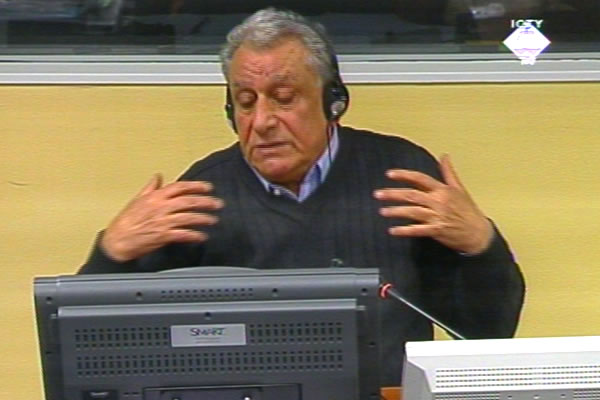Home
BEATINGS ‘WITHOUT RHYME OR REASON’
Dr Hicham Malla described the beatings and humiliation in the Stajicevo prison camp in Serbia where he was detained after the fall of Vukovar. Dr Malla claims that in Borovo Naselje he treated and fed Goran Hadzic’s 80-year old uncle. ‘That’s gratitude for you, I was beaten while they ruled Krajina’, the witness said
 Hicham Malla, witness at the Goran Hadzic trial
Hicham Malla, witness at the Goran Hadzic trial To this day, Dr Hicham Malla ‘cannot understand’ why he was taken out from the shelter in Borovo Naselje near Vukovar on 19 November 1991 and transported to the Stajicevo prison camp in Serbia. In his evidence at the trial of Goran Hadzic, former prime minister of the Serb Autonomous Region of Eastern Slavonia, Dr Malla said that he spent two weeks in Stajicevo together with about 1,200 other detainees who had been brought there from the Vukovar area.
In 1964, the witness came to Croatia from Syria to study medicine and he stayed on in Croatia with his wife and children. When the shelling of Vukovar began, he helped the wounded and the sick. The witness lost his wife on 8 November 1991 when she was killed by a shell; he was gravely injured. After the fall of Vukovar, Dr Malla was put on a bus and brought under the JNA escort to the swine farm in Stajicevo, Serbia.
The beatings began as soon as the detainees got out of the bus and went on as they walked to the hangar ‘without rhyme or reason; they never even asked our names’, the witness recounted. Although he had an armband with a red cross indicating that he was a medical doctor, the witness and his colleagues fared worse than the rest of detainees. They were accused of being ‘murderers’ who ‘sold the organs of the wounded Serbs’. Among the detainees from Vukovar there were some Serbs. They ‘gathered courage’ to tell the authorities they were Serbs and were transferred to another part of the stables. The witness also spoke up, saying he was a foreign national and a doctor. This proved to be a mistake, because he was accused of being a ‘mercenary’. The witness was transferred among the Serb prisoners after one of the soldiers recognized him. Dr Malla agreed to set up a make-shift infirmary in Stajicevo together with four other detained doctors.
When they arrived in the prison camp there were no toilets. The detainees had to relieve themselves by the wall in the same room where they slept. Each morning at 5 am the detainees had to sing a verse from the Yugoslav national anthem ‘Damned be the traitor of his homeland’. Every day, the detainees were interrogated and beaten up. One prisoner died of the beating. Among the prisoners there were 19 children between the ages of 12 and 17, and 47 persons older than 60, the witness said. In the first three days of their captivity, the detainees ‘received starvation rations’, a little bit of cheese or a third of a frankfurter. The prisoners got their first cooked meal when the Red Cross representatives came, on 2 December 1991. Dr. Malla was released that day.
In an emotional address, the witness described how he treated and fed Hadzic’s 80-year old uncle during the siege of Vukovar. ‘That’s gratitude for you’, the witness said, ‘I was beaten while they ruled Krajina’. Hadzic’s defense counsel contested the claim that the wounded old man was a relative of the accused. Also, the defense counsel said that from 1979 to 1981 the witness took part in the civil war in Lebanon.
Linked Reports
- Case : Karadzic
- 2013-04-11 PRESIDENT OF ‘COMMITTEE FOR TRUTH’ ABOUT KARADZIC TESTIFIES IN HIS DEFENSE
- 2013-04-10 RELIGION DETERMINED MENU IN KULA PRISON RESTAURANT
- 2013-04-09 DODIK BLAMES IZETBEGOVIC, HIGH REPRESENTATIVE AND OTP
- 2013-04-15 GENERAL GALIC BEGINS TESTIMONY IN KARADZIC’S DEFENSE
- 2013-04-16 MUSLIMS SHELLED THEIR OWN PEOPLE TO BLAME SERBS
- 2013-04-16 WAS KARADZIC AMONG ‘THOSE AT THE TOP’
